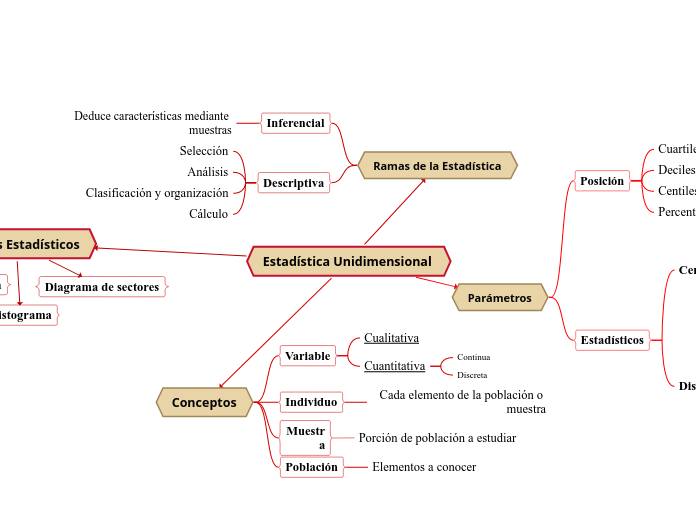Estadística Unidimensional
To name your story, you have to think about the overall message and what you want your audience to understand from the story. Also, make it relevant and easy to remember.
Gráficos Estadísticos
Histograma
Diagrama de barra
Diagrama de sectores
Ramas de la Estadística
The ending of a story is essential. We all know that if the ending is weak, what happened before loses its importance. So make it unpredictable, but fair. A resolved ending answers all the questions and ties up any loose threads from the plot.
Descriptiva
This is the closure section of the story.
See examples of possible outcomes below:
- all problems have been solved
- it's clear how each one of your characters ends up
- your main character is transformed by the challenge
Cálculo
Try answering these questions in order for you to come up with a closure:
- Have all problems been solved?
- Is it clear what happens with all your characters in the story?
- Has the challenged transformed your main character?
- How do the characters feel in the end?
Clasificación y organización
Análisis
Selección
Try answering these questions to come up with a closure:
- Have all the problems been solved?
- Is there a clear picture of what happens with each character in the story?
- Has the challenge transformed your main character?
- How do the characters feel in the end?
Inferencial
This is the moment when the main character surpasses the last obstacle and finally faces their greatest challenge.
The climax usually follows one of these patterns:
- realization
- resolution
- choice
Type in your answer.
Deduce características mediante muestras
Conceptos
The middle of the story is where you add layers of complications that will lead to the end. Reveal more about the character's journey. Did their personality go through changes? How did they overcome the challenges? And as you build up the story’s central conflict, make it more personal to that character. Also, from the middle act, you have to lead into the final act.
Población
There wouldn't be any tension and excitement in your story if there weren't any obstacles in your character's way.
Elementos a conocer
A story is nothing more than a character overcoming a series of difficulties to reach the desired goal. Obstacles usually create suspense and conflict. In overcoming obstacles, there is growth: weak becomes strong; hatred turns into love; sadness into happiness; wrong into right; lies into truth; or evil becomes good.
See a few examples below:
- stopping a meteor
- finding a killer
- finding love
Muestra
Porción de población a estudiar
Individuo
Your character(s) need(s) motivation in order to solve the challenge(s).
Cada elemento de la población o muestra
Why does your character need to confront this challenge? What does he/she expect to accomplish by solving it?
See a few examples:
- will marry in 3 days
- can fix the mistakes of the past
Variable
Each story has a main character and that character usually needs to solve a problem or challenge. The character's challenge is the one that creates tension throughout the story.
Cuantitativa
Type in any other challenges which other characters in the story need to face.
Discreta
Continua
Cualitativa
In most stories, there are 3 challenges. The number 3 is a mystical number symbolizing completeness. Try to come up with interesting challenges with which your character needs to struggle.
See a few examples below:
- turns into a werewolf at night
- is sent back in time
Parámetros
In the beginning of the story (or the exposition), you will need to introduce the setting and characters. You might also want to introduce the main conflict. This part of the story is important because it gives the reader necessary background information and maybe even a first insight into a character’s personality.
Estadísticos
The setting (time & place) of a story can change throughout the plot.
Dispersión
The weather is an important element in your story because it can highly influence the ambiance and the mood of the characters.
Coeficiente de Variación
Desviación Típica entre la media aritmética
Recorrido
Diferencia del dato mayor y el dato menor
Desviación Típica
Decide if you want to include an element of nature in your story. For example, a rainbow can be a very nice choice for a happy ending. The mist in a story can represent mystery and secrets. A thunder can appear in the background at the moment when the 'bad guy' of the story makes its appearance, etc.
Raíz cuadrada de la varianza
Varianza
Does your story include catastrophic weather? See a few suggestions below or add your own:
- hurricane, earthquake, storm, etc
Suma de las x al cuadrado por su frecuencia entre el numero total de datos menos la media al cuadrado
Centralización
The time of the story can also change. It can describe the event of a single day or can include an entire year's plot. Anyway, don't forget to mention it.
Mediana
Valor en el centro de la distribución
Moda
Valor que más se repite
Media aritmética
Suma de las x por su frecuencia entre el número total de datos
Posición
Characters are essential to a good story. Usually, the protagonist(s) is/are the most affected by the plot. Introduce a character by focusing on their actions, interests, and occupation, as the physical appearance doesn't make a difference in most cases.
Percentiles
Centiles
Deciles
Cuartiles
Type in the name of your character.










